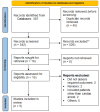Effects of Targeted Hypercapnia on Mortality and Length of Stay of Post-cardiac Arrest Patients: A Systematic Review and Meta-Analysis
- PMID: 38894798
- PMCID: PMC11185866
- DOI: 10.7759/cureus.60617
Effects of Targeted Hypercapnia on Mortality and Length of Stay of Post-cardiac Arrest Patients: A Systematic Review and Meta-Analysis
Abstract
Therapeutic hypercapnia has been proposed as a potential strategy to enhance cerebral perfusion and improve outcomes in patients after cardiac arrest. However, the effects of targeted hypercapnia remain unclear. We conducted a systematic review and meta-analysis to evaluate the impact of hypercapnia compared to normocapnia on mortality and length of stay in post-cardiac arrest patients. We searched major databases for randomized controlled trials and observational studies comparing outcomes between hypercapnia and normocapnia in adult post-cardiac arrest patients. Data on in-hospital mortality and the ICU and hospital length of stay were extracted and pooled using random-effects meta-analysis. Five studies (two randomized controlled trials (RCTs) and three observational studies) with a total of 1,837 patients were included. Pooled analysis showed hypercapnia was associated with significantly higher in-hospital mortality compared to normocapnia (56.2% vs. 50.5%, OR 1.24, 95% CI 1.12-1.37, p<0.001). There was no significant heterogeneity (I2 = 25%, p = 0.26). No statistically significant differences were found for ICU length of stay (mean difference 0.72 days, 95% CI -0.51 to 1.95) or hospital length of stay (mean difference 1.13 days, 95% CI -0.67 to 2.93) between the groups. Sensitivity analysis restricted to mild hypercapnia studies did not alter the mortality findings. This meta-analysis did not find a mortality benefit with targeted hypercapnia compared to normocapnia in post-cardiac arrest patients. The results align with current guidelines recommending a normal partial pressure of arterial carbon dioxide (PaCO2) target range and do not support routinely targeting higher carbon dioxide levels in this setting.
Keywords: hypercapnia; length of stay; mortality; normocapnia; systematic review and meta-analysis.
Copyright © 2024, Damarlapally et al.
Conflict of interest statement
The authors have declared that no competing interests exist.
Figures
References
-
- Neurologic function and health-related quality of life in patients following targeted temperature management at 33°C vs 36°C after out-of-hospital cardiac arrest: a randomized clinical trial. Cronberg T, Lilja G, Horn J, et al. JAMA Neurol. 2015;72:634–641. - PubMed
-
- Critical care of the post-cardiac arrest patient. Walker AC, Johnson NJ. Cardiol Clin. 2018;36:419–428. - PubMed
-
- Post cardiac arrest syndrome: a review of therapeutic strategies. Stub D, Bernard S, Duffy SJ, Kaye DM. Circulation. 2011;123:1428–1435. - PubMed
Publication types
LinkOut - more resources
Full Text Sources


